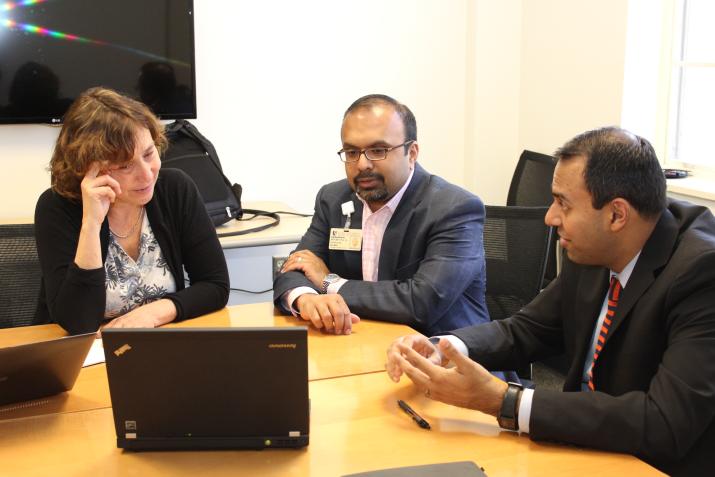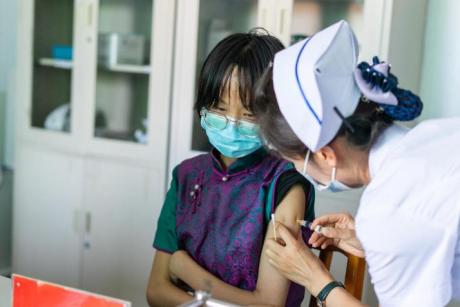
(l to r) Anita Hardon from the University of Amsterdam meets with Duke's Dev Sangvai and Krishna Udayakumar during her visit to Durham, NC, in March 2015. Sangvai and Udayakumar are part of Duke's AHTI team.
Published March 31, 2015, last updated on June 3, 2020 under Research News
In November 2014, the Amsterdam Institute for Global Health and Development launched the Amsterdam Health & Technology Institute (AHTI) in partnership with the Duke Global Health Institute (DGHI) and the city of Amsterdam. The institute was founded in response to a call from the city of Amsterdam for proposals to create an applied technology institute in Amsterdam.
Since November, AHTI staff and collaborators, including faculty from DGHI and other Duke departments, have been advancing AHTI’s mission of improving health and achieving better quality health care at lower cost. They’re establishing an infrastructure for their work, initiating projects, sharing best practices in clinical innovations and engaging in international faculty exchanges.
AHTI is focusing on three key strategies to fulfill this mission:
- Attract health and technology talent to Amsterdam
- Build a portfolio of innovative research
- Develop capacity for entrepreneurship
AHTI’s projects will focus primarily on health care issues and solutions related to aging and helping people manage chronic diseases outside of the hospital setting.
“Living Labs” Help Spread Great Ideas
To support and enhance their work, AHTI is cultivating a network of “living labs” across the world. Living labs are places where experts from varied disciplines can develop, launch, and test new technologies and other innovations. AHTI is building this network based on existing partnerships, with labs currently in Nairobi, Shanghai, Amsterdam and Durham.
Ann Lore, senior manager of international partnerships at DGHI and AHTI’s director of operations, emphasizes that innovative ideas know no borders. The concept of living labs helps facilitate the exchange and development of ideas across countries and cultures—whether they’re initiated in high-, middle- or low-income countries. “At AHTI, we believe there’s no hierarchy when it comes to good ideas,” Lore said.
Health Care Solutions Can Transfer from One Urban Area to Another
Lore also argues that affordable, innovative health care solutions that work in densely populated high-income countries like the U.S. and Amsterdam may very well be applicable in cities in low-income countries. Contrary to popular perception, many low- and middle-income communities are nestled in an urban environment. Some of the largest cities and slums—for example, Nairobi—are found in the poorest countries.
AHTI’s living lab network will enable innovations developed and implemented in high-income countries to be tested and adapted for use in other settings around the world, and vice versa.
John Bartlett, professor of global health and medicine, believes that the application of technology holds great promise for improving health care outcomes. “The opportunity to work with colleagues from Amsterdam is exciting,” he said, “and the ability to evaluate the impact of these interventions in such diverse settings within the living laboratories is in perfect alignment with the DGHI mission of reducing health disparities.” Bartlett co-directs AHTI’s research and innovation program area, along with Tobias Rinke deWit from AIGHD. AHTI leadership also includes DGHI director Michael Merson, DGHI faculty members Randall Kramer and Krishna Udayakumar and Nicholas School of the Environment professor Jesko von Windheim.
AHTI Sponsoring Talk this Week by Prominent Social Scientist
This Thursday, April 2, as part of an ongoing faculty exchange between the University of Amsterdam and Duke University, AHTI is sponsoring a presentation by Anita Hardon, professor of health care and director of the Amsterdam Institute for Social Science Research at the University of Amsterdam.
Hardon will present examples of ethnographic research on sexuality and secrecy that provide insights on secret practices that hinder the implementation of sexual and reproductive health care programs. She’ll also discuss methods that can be used to study secrets and ethical issues related to research on secret practices.
Hardon is a member of AHTI’s scientific steering committee, chaired by DGHI director Michael Merson.


